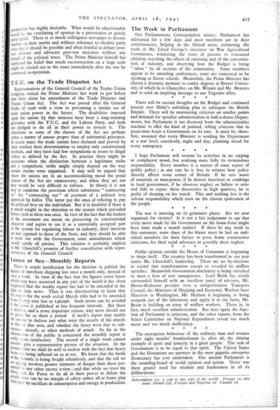T.U.C. on the Trade Disputes Act
Representatives of the General Council of the Trades Union Congress visited the Prime Minister last week to put before him their claim for amendment of the Trade Disputes and Trades Union Act. The Act was passed after the General Strike of 1926 with a view to preventing a similar use of trade union power in the future. The disabilities imposed upon the unions by that measure have been a long-standing grievance with the T.U.C. and the Labour Party, and both are pledged to do all in their power to reverse it. The objections to some of the clauses of the Act are perhaps rather a matter of amour propre than of substantial grievance. In recent years the trade unions have declared and proved by their conduct their determination to employ only constitutional methods, and they have had few temptations to resort to illegal strikes as defined by the Act. In practice there might be occasions when the distinction between a legitimate strike and a sympathetic strike might simply depend on the way certain unions were organised. It may well be argued that when the unions are in an accommodating mood the penal clauses of the Act are unnecessary, and when they are not they would be very difficult to enforce. In theory it is not easy to condemn the provision which substitutes " contracting in" for " contracting out " of payment of a political levy approved by ballot. The latter put the onus of refusing to pay the political levy on the individual. But it is doubtful if there is as much weight in the objection to the system which prevailed before 1926 as there was once. In view of the fact that the leaders of the movement are intent on preserving its constitutional character and aspire to see it as a universally accepted, part of the system for regulating labour in industry, their interests are not opposed to those of the State, and they should be able to work out with the Government some amendments which would satisfy all parties. This solution is probably implicit in Mr. Churchill's promise of further consultation with repre- sentatives of the General Council.


























 Previous page
Previous page